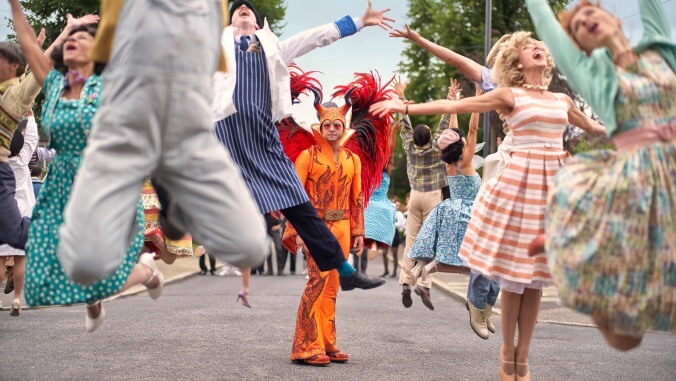The Elton John biopic Rocketman works best when it remembers to be a musical

Would it be giving Rocketman too much credit to assume that the filmmakers behind this Elton John biopic (who include executive producer Elton John) are at least faintly aware of their film’s hoariness? The movie opens, like so many musical biographies (and one timeless spoof) before it, with a famous singer reflecting on the ups and downs of his life. But when Elton John (Taron Egerton) marches into a 12-step-style recovery meeting in a gray, nondescript room, he’s wearing an enormous, winged devil costume, as if he just stepped off the stage at the Nassau Coliseum. The movie at least has the decency to wink at the blatant artifice of the structure it’s assembling.
Director Dexter Fletcher is familiar with biopic artifice; he recently took over the final stretch of filming on Bohemian Rhapsody after Bryan Singer got himself fired, and he previously teamed with Egerton on the true-life underdog sports story Eddie The Eagle. He knows that boilerplate for a movie like this must include fraught parental relationships, in this case young Reginald Dwight’s vaguely disinterested mom (Bryce Dallas Howard) and extremely distant, then entirely absent dad (Steven Mackintosh), who offer little in the way of encouragement of his prodigious piano playing. But Reggie qualifies for a scholarship, changes his name, and in casting about for a music-biz career gets paired with lyricist Bernie Taupin (Jamie Bell). Fame, fortune, and desperate attempts to feel properly loved ensue.
The basic outline of this material is not especially engaging, especially when its details feel as if they’ve been vetted by the film’s very famous subject/producer. As in Bohemian Rhapsody, Elton John is literally seduced by a music-biz figure who makes the sometimes-shy singer more comfortable with his homosexuality, then seizes control of his career. Hilariously, Rocketman’s villain of choice is John Reid (Richard Madden), who also figures into that same narrative in Bohemian Rhapsody—only there, he’s the well-meaning manager cruelly manipulated by Freddie Mercury’s ex-lover/ex-manager Paul Prenter. (Reid also managed Michael Flatley, so maybe a third music biopic is needed to fully judge his legacy. Look for Lord Of The Dance in, oh, let’s say 2022.)
But as tedious as Rocketman is when it’s going through the biographical motions, it’s equally delightful when it launches into something most rock movies pointedly avoid: full-on musical numbers. Elton John’s familial struggles don’t have much nuance, but when members of his family take turns singing lines of his late-’90s hit “I Want Love,” it’s the closest they come to generating real pathos. The transition from John’s childhood to young adulthood is managed with an elaborate, ebullient production of “Saturday Night’s Alright For Fighting.” The title song finally emerges to soundtrack a suicide attempt, and while the theatrics of the number are corny (especially in its literal-minded climax), it’s a lot more effective at creating a visualized Elton John headspace than the terribly dull Elton-needs-a-hug psychological angle.
The film’s use of the Elton John catalog also unmoors the narrative from strict chronology—an action nearly all rock-bio movies must perform, but at least Rocketman doesn’t try to pass it off as compressed reality. Though there are a few glimpses of John’s collaboration with Taupin, their songs floating out of time; Taupin’s lyrics turn up on screen before he does. It’s a pretty good impression of how many fans have experienced John’s work, and the levitational effect it can have—illustrated with some literal floating, naturally—as well as a celebration of the performer’s theatricality.
So it makes sense that the musical numbers are where Egerton feels most energized. Like Rami Malek’s recent Oscar-winning turn as Freddie Mercury, Egerton’s performance is more spirited impression than deep dive into his subject’s soul, and his supporting cast doesn’t have much room to grow in between song breaks. Make no mistake, Rocketman is padded with all the standard bad-biopic fixings: awkward dialogue sum-ups (“life gives you very few chances, and this is yours”), headline-festooned success montages, and pedestrian images assigned more weight than they can bear. At one point, Elton stares mournfully into a mirror, covering up a bruise on his face as he downs wine and snorts cocaine; presumably not having him write “I hate myself” on the mirror in lipstick was considered a model of restraint.
Restraint—and the false sense of decorum that comes with it—is probably why the movie never goes full-on Across The Universe. The filmmakers constantly impose pointless limitations on their best materials: The musical numbers are compelling but sometimes curtailed, as if audiences will shift in their seats impatiently when an Elton John movie plays Elton John songs all the way through. (Bohemian Rhapsody at least understood that showing a large chunk of the band’s Live Aid show would only endear it more to fans.) The film’s color palette remains dreary and muted, even as John’s costumes grow more flamboyant. As inventive as the movie gets in teasing out both the melancholy and the joy of John and Taupin’s songs, Rocketman still genuflects toward the myth of biopic respectability.